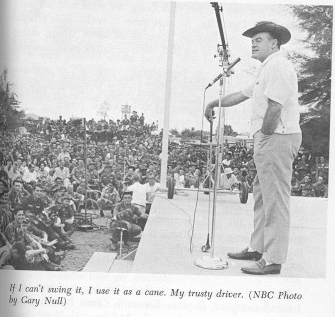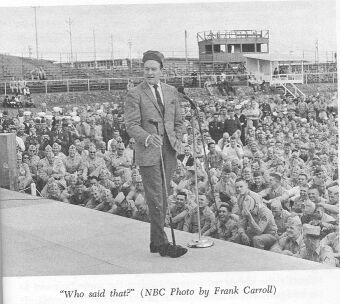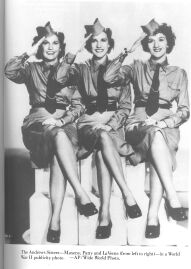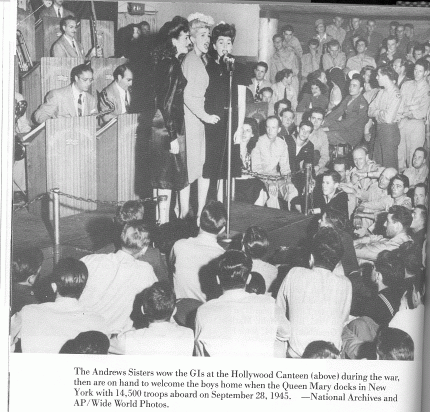

![]()
History of the USO
Six decades ago, President Franklin Roosevelt conceived an organization--the USO--for the singular, but enduring purpose of reaching out directly from the American people to those in military uniforms who serve them. Non-governmental, but civilian and voluntary in make-up, the organization would serve as a link of compassion and reassurance from the ordinary citizen, that America cares, remembers, and supports the service and sacrifice of those who defend her. It would deliver morale enhancing programs and services around the world. Put simply, through its unique and selfless personality and character, the USO would deliver "America" to those far from home.
Throughout World War II, USO was the channel for community participation in the war effort. In over 3,000 communities, USO centers were established to become the G.I.'s "Home Away From Home". Between 1940 and 1944, U.S. troops grew from 50,000 to 12 million and their need for a variety of services grew accordingly. USO facilities were quickly opened in such unlikely places as churches, log cabins, museums, castles, barns, beach and yacht clubs, railroad sleeping cars, old mansions and storefronts.
USO programs were as varied as the places that housed them. While most aimed to provide off-duty recreation for the mostly male and fairly young service personnel, some were designed for women in uniform, while others provided child care for military wives. USO's could be many things to many people: a lively place to dance and meet people; a place to see movies or find religious counsel; a quiet place to talk or write letters; or, of course, the place to go for free coffee and doughnuts.
The USO truly made history when it came to entertaining the troops. From 1941 to 1947, USO Camp Shows presented an amazing 428,521 performances. There were sometimes 700 or more performances each day, all over the world. Over 7,000 entertainers, "brave soldiers in greasepaint" traveled overseas, from the biggest movie stars to unknown vaudevillians. Some never returned, having fallen beside the fighting men or perished en route in plane crashes. By the end of the second World War, the USO could claim that more than 1.5 million volunteers had worked on its behalf.

In the 1970's when the draft ended, the need for USO was questioned; but after reviewing its programs, it was decided to keep it. The USO was launched into a new era of peacetime service. Programs were developed to smooth frictions between military and local communities and for the first time, the USO helped those leaving the service make the transition to civilian life. Its headquarters moved from New York to Washington, D.C. in 1975.
Throughout the 80's USO increased its scope of peacetime services and expanded its family focus. Today's composition of the U.S. Armed Forces has changed dramatically, not primarily single and male; but 10.5% female and frequently married. Over 50% of today's military are 18-25 and married with children. USO entertainment in the 80's retained its stellar reputation with superstars from all phases of the entertainment industry.
The 1990's, with the U.S.troops being deployed to the desert for at least 6 months at a time, and the Persian Gulf War, challenged USO to meet the needs of our troops in unique circumstances. USO opened 3 new centers in the Middle East and established the USO Mobile Canteen Program. They are 4-wheel drive, all-terrain vehicles that have refreshments, books, magazines, video and cd players for recreational activities. USO workers drove the vans to wherever the troops were deployed to provide some relief from the heat and boredom.
The USO currently operates more than 160 centers worldwide; 77 overseas and 83 stateside. USOs in 10 countries and 22 states utilize the services of some 12,000 volunteers, from those who serve on the World Board of Governors, the USO's governing body, to those who dish up Thanksgiving dinners to USO guests.
The USO operates 78 Family and Community Centers to help military families adjust to new surroundings with info. on childcare co-ops, employment opportunities, parenting, nutrition, budgeting and recreational programs.
Today, USO Celebrity Entertainment shows are effective morale boosters and remain the best-known of USO's offerings. Even in peacetime, entertainers provide a much-needed break in the midst of duty tours overseas.
Even though the Cold War is over, a high number of our armed forces serve in conflicts and crises around the world. The once clearly defined enemy has become blurred in the minds of many in America. The mood of the nation--certain or uncertain; supportive or lacking in support-- transmits directly to those in uniform. The need to know that America cares continues to be as important as ingredient of confidence and effectiveness as it ever has been. Put simply, today, as it has for six decades, and for as far into the future as anyone can see, the singular mission of the USO continues.
Visit USO on the internet: http://www.USO.org
![]()
USO entertainment show, Kuwait, 1998
"We stand today on the edge of a new frontier" John F. Kennedy
Members of the United States Green Berets
"If we cannot now end our differences at least we can help make the world safe for diversity" John F. Kennedy
United States Navy Seals using an inflatable raft to enter the sea
"Let me assert my firm belief that the only thing we have to fear
is fear itself" Franklin D. Roosevelt
Lone Marine walking the perimenter in Bosnia, 1999
"In war, resolution; in defeat, defiance; in victory, magnanimity;
in peace, goodwill" Winston Churchill
A patrolling U.S. Coast Guard boat
"Only a life lived for others is a life worthwhile" Albert Einstein
United States Army Mh-4/helicopters and men in special operations
"Whatever America hopes to bring to pass in this world must first come to pass in the heart of America" Dwight D. Eisenhower
The following pictures are from a Bob Hope Christmas Tour in the Philippines in the 1970's:
The base gets ready for the USO show:
Likeness of Bob Hope on plane
"The Man" himself!
Bob--the Master of Ceremonies
Bob with Lee Greenwood whose song, "Proud To Be An American" became the theme of the USO shows at the time.
Lee performs for the troops
Bob with Barbara Eden ("I Dream of Jeannie")
"The Reward of a thing well done is to have done it" Ralph Waldo Emerson
The following pictures are taken from USO shows from the World War II era:



The Andrews Sisters-- the "darlings" of WWII- USO Shows

Songs like, "Boogie Woogie Bugle Boy" and "Chatanooga Choo-Choo" were big hits
"Nothing great was ever achieved without enthusiasm" Ralph Waldo Emerson
![]()